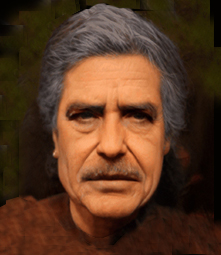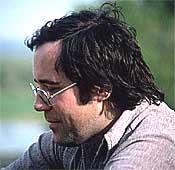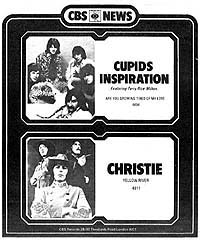|
|
|
Jeff
Christie
(vocals, bass,
keyboards)
|
|

|
|
Vic
Elmes
(lead guitar,
vocals)
|
|
|
|
Paul
Fenton
(drums)
|
|

|
|
Mike
Blakley
(drums)
|
|
|
|
Lem
Lubin
(bass)
|
|
|
|
Roger
Flavell
(bass, vocals)
|
|

|
|
Danny
Krieger
(lead guitar)
|
|

|
|
Terry
Fogg
(drums)
|
|
|
|
Greg
Ainsworth
(lead guitar)
|
|
|
|
Roger
Willis
(drums)
|
|
|
|
Tony
Ferguson
(guitar)
|
|
|
|
Adrian
Foster
(lead guitar)
|
|
|
|
Kevin
Moore
(bass, vocals)
|
|
|
|
Simon
Kay
(drums)
|
|
|
HAVING been raised in a musical family, it
is no surprise that Jeff Christie has carved a career as one
of the industry's most brilliant songwriters. Jeff's mother
was a ballet dancer who intsilled in him a knowledge of the
classics, which later evolved into a love for flamenco and
rock and roll music. Early piano lessons and classical music
studies provided a valuable grounding for Jeff's gradual progression
into a talented guitar player and composer.
Born
in 1946, Jeff formed his first band in his hometown of Leeds,
in the UK. The group was called The 3Gs+1, because the other
members apart from Jeff had names which began with the letter
G. Skiffle was the order of the day, but Jeff started to move
into guitar instrumentals and the emerging rock and roll sound
with his next group, The Tremmers.
This then developed into the Outer Limits—
which included Stan Drogie, Gerry Layton and Gerry Smith —
and the outfit eventually emulated the Beatles' sound, thereby
becoming Yorkshire's local versions of the legendary group.
See here for more on the band.
They gradually specialised in playing songs tinged with a
soulful, Tamla-Motown sound, with Jeff — somewhat of
a child prodigy with his music skills — writing many
of the songs the band would play.
But unlike the majority of
their fellow amateur musicians, Jeff’s band even managed to
release some singles. The most noteworthy were Just
One More Chance/Help Me Please, released
by Deram (Decca’s more progressive label) in 1967, and Great
Train Robbery/Sweet Freedom, which came out
one year later on the local Instant label.
All the songs had been written
by Jeff, with Great
Train Robbery in particular showing the
emergence of his flair for melodic and appealing top lines,
as well as his fascination with places in the US and US historical
events — a theme he would revisit many times with his
songs for Christie.
While Just
One More Chance was a minor smash in the charts (it
even spawned a number of cover versions), neither single was
overly successful for Outer Limits, resulting in the band’s
break-up - and apart from Jeff, none of the other members
pursued a musical career. Jeff tells more about the Outer
Limits line-up in his interview.
Jeff decided to continue as
a songwriter, if not a performer, and despite his preference
for making "progressive" music — along the
likes of Humble Pie and Cream - he knew that his songs would
find a more immediate audience if they were more commercial.
He switched to what he calls his country pop phase, and put
together a fine portfolio of his own compositions. He did
what any budding writer in the business would. He tried —
unsuccessfully — to get various record companies and
song publishers interested in his songs with a demo tape.
His quest ended when the lead
guitarist of the Tremeloes, Alan Blakley, got the tape. The
Tremeloes liked the catchiness of Yellow
River, and recorded it in a few different ways. But
because the Tremeloes were at the time enjoying success with
their own material, they subsequently passed on the chance
to release any of Jeff's songs.
Jeff has told me that he knew
he had a winner in Yellow River,
though. Other groups had also registered an interest in recording
the song, but Jeff decided to form his own namesake group
to release the piece — to build a band around himself
as the vehicle.
"I was young and a bit overwhelmed,
and at the time it felt like the right thing to do," he told
me.
At the same time, Alan Blakley
had suggested to his brother Mike that he and guitarist Vic
Elmes, with whom he played in another band, The Epics, form a band to record Yellow
River.
(Interestingly, the drummer
who preceded Mike in The Epics — Bill 'Legend' Fyfield
— was to later achieve fame playing in Mark Bolan's band,
T Rex. Ironically, the T Rex connection would be resurrected
some years after when Christie's second drummer, Paul Fenton,
also played with Marc Bolan.)
 Seeing potential in Yellow River,
the Tremeloes' publicity man and subsequent manager Brian
Longley (pictured) told Jeff of Vic and Mike's availability.
The happy coincidence resulted in the formation of Christie.
Seeing potential in Yellow River,
the Tremeloes' publicity man and subsequent manager Brian
Longley (pictured) told Jeff of Vic and Mike's availability.
The happy coincidence resulted in the formation of Christie.
The name of Jeff's new group
was decided upon when the band members agreed Jeff's surname
had a nice ring to it. It was also the trend at the time to
name bands after the lead singer and performer.
Christie signed with CBS Records in England, the same home
as the Tremeloes. The debut single Yellow
River
— essentially Jeff's vocals over the Tremeloes backing
track — was issued in spring of 1970. The Tremeloes'
manager, Mike Smith, feeling bad that the Trems had turned
down Yellow River,
helped produce the single.
 The record quickly sailed to No 1 in 26 countries across
the world, staying on the pop charts for 22 weeks. It peaked
at No 6 in the US, where the single was released on CBS' Epic
label.
The record quickly sailed to No 1 in 26 countries across
the world, staying on the pop charts for 22 weeks. It peaked
at No 6 in the US, where the single was released on CBS' Epic
label.
Of course, a follow-up single
had to be released, and in this Jeff once again had the Midas
touch in the truest sense of the phrase. In October 1970,
San Bernadino
was released, and its success seemed destined to launch Christie
on a stellar career. While it "only" reached No 5 in the English
charts, the extremely catchy pop song rocketed to No 1 in
Germany and across Europe. Only in the USA was the song conspicuously
absent from the charts, climbing no higher than No 92.
Conversely, Christie's eponymous
debut album
did better in the US than in the UK. The LP, containing
the two big hits and a stack of commercial, pop-rock songs,
stayed in the US charts for 10 weeks.
Christie were quickly booked
for extensive world tours, and indeed, over the next few years,
would become one of the most travelled bands ever. Because
Mike Blakley had not been playing since The Epics folded,
his drumming had become rusty to the point where it was considered
a liability. He was asked to leave the group, and was replaced
by Paul Fenton. (On the first album, session drummers Clem
Cattini and Hugh
Grundy were used.)
It was perhaps
around this time that the first hiccup in the publicity machine
occured. Although every single track on the Christie LP was
worthy of release on its own, no third single from the set
was put out to follow San Bernadino.
In hindsight, it could have enhanced the band's profile had
a third, or even fourth, single been lifted from the strong
debut album, as the songs were so catchy that they surely
would have charted, boosting the group's image as well as
sales of the album.
Instead,
the recording company chose to release Man of Many Faces
as the third single, at the same time as the first album was
in the stores, even though the song was not on that set.
It was not until 1971 that
there was enough time to work on the second album, and For All Mankind
demonstrated an attempt by Jeff Christie to return to
his progressive roots and diversify into a heavier sound,
infused with rock, blues and country. CBS and manager Longley
tried to promote one of the songs, Picture
Painter, in an advertisement and video. Curiously,
Picture
Painter was only released as a single
in SE Asia and nowhere else, and again demonstrates that perhaps
Christie were the unfortunate victims of poor boardroom decisions.
Christie returned to the bright,
poppy formula with a vengeance in 1972 with Iron Horse,
hailed by critics as one of Jeff's best compositions. Its
catchy appeal, sublime melody, and innovative twangy intro
indeed make this song one of the best pop-rock pieces ever
composed.
The single was
also used as a springboard to announce the addition of Lem
Lubin (from pop band Unit 4+2) as a member of the group. Lem
had been recruited to play bass on stage, enabling Jeff to
focus on other instruments during Christie's live performances.
Despite being featured on various record sleeve covers and
also in the Iron Horse video,
Lem never actually played on the single.
Success was also achieved
in South America, where Christie always enjoyed a frenzied
following, and a Vic Elmes composition called Jo Jo's Band
did well for them in that continent.
Sadly, the relationship between
Jeff and Vic eventually worsened, just as the band was recording
songs for the third album. Matters were exacerbated
in 1973 when Lem left, being replaced by Roger Flavell.
Lem
became a producer of some successful albums for other artists,
and also helped compose Free Inside,
a song that was used in the movie versions of the popular
British TV comedy series Porridge.
Shortly after Paul, who enjoyed
a close friendship with Jeff, departed the group to join the
group Carmen (see Paul's interview), leaving
Jeff jaded and seriously considering a restructure and new
direction for the band.
Jeff announced he would be
considering a solo career, and split the group up. Vic was
forced to take up an office job, but later pursued his own
personal musical ventures.
After a month or so, Jeff
changed his mind and decided to form a new Christie band with
Roger. Terry Fogg, who had been a drummer with UK group Sounds
Incorporated, was recruited, as was American lead guitarist
Danny Krieger. Jeff continued recording under the Christie
name, and for the first time started using other composers'
material. The Dealer received good reviews, and
nudged the top 100 in the UK. In 1974, Christie was moved
on to the CBS sub-label, Epic, which released Alabama/I’m Alive.
After a tour of Spain, Danny left the band to return to
the USA. With more gigs in Spain and Germany booked, a musician
named Greg Ainsworth filled
in the gap left by Danny.
After returning
to England, Greg and Terry quit, and Roger suggested
teaming up with Tony Ferguson (lead guitar), Roger Willis
(drums), and Graham Whyte (guitar), members of the band Capability
Brown. This was to become the last Christie line-up
before the group's demise. However, just as the band was about
to embark on a tour of South America and Mexico, Graham changed
his mind and left the group, leaving the band as a foursome
again. The band put out cover versions of two popular Spanish
songs, Guantanamera/Navajo, to
resurrect their South American popularity.
Jeff broke the band up after
they returned from the tour. However, in 1976, Jeff released
Most Wanted Man in the USA, the
last single put out under the Christie name. Jeff was backed
by some impressive studio musicians, including the respected
drummer Simon Phillips, who was to play with The Who on their
reunion tours, and John Perry, who had been part of the cult
rock band Caravan.
Terry, Danny, Tony and the
two Rogers had low public profiles, appearing only on the
occasional poster or promotional shoot, and were ostensibly
faceless studio musicians backing Jeff on lead vocals. Most
of their time was taken up playing in various countries as
Christie continued with a heavy tour schedule. With no recognition
given to these band members on the Christie singles,
it is little wonder that most fans consider that the "true"
Christie died after Vic and Lem departed.
In 1980, Jeff shifted to the
minor RK label, which produced the singles Tightrope/Somebody Else
and Both Ends of the Rainbow/Turn On Your
Lovelight, both released under Jeff's own name.
An album containing these songs and others was also slated
for release but never eventuated as RK collapsed soon after,
in effect also limiting distribution of the singles, which
today are highly sought after. The
songs were eventually released on CD in 2009.
Today, Jeff is respected for
the fine songsmith that he is, and frequently gets approached
by various artists to write songs for them. Jeff was chosen
to contribute a song for a UK Eurovision Song contest bid,
and has been invited to lecture at songwriting workshops.
As well, he writes advertising jingles, although his biggest
success in this field is still Yellow
River, used in the UK to promote The
Yellow Pages. He appears on the occasional classic
hits shows, playing the songs that made him famous, and does
what he has always done: travel the world.
Jeff's current
Christie band consists of Jeff on lead vocals and guitar;
Adrian Foster on lead guitar; Simon Kay on drums; and Kevin
Moore on bass. The group started playing together in the late
80s/early 90s, so while they haven't recorded any studio material,
ironically this quartet is the longest-serving line-up to
play under the Christie name.
>copyright
Ray Chan.
|

